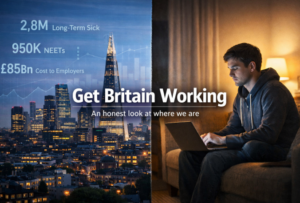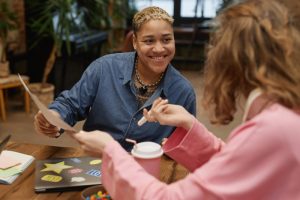Learning Technologies is a thriving industry, and women make up some of its most capable and accomplished figures. We spoke to some of our training heroes for motivation and insights
Saffron works with organisations all across the world. This means that we have the privilege of working with some of the most talented individuals in almost every role you can imagine. us.
Moreover, strong and intelligent women have always formed a core of Saffron’s management team, and we’re immensely proud of this. Lately, we’ve been inspired to reflect on the achievements of the high-achieving women we’ve been working with recently. We asked a select group of our friends and clients to share some of their career highlights.
Enjoy reading some motivational and insightful words from Hayley Jay and Louise Cooke of Australian lifesaving charities Surf Life Saving New South Wales and Surf Life Saving Australia, thought leader (and change management specialist for Richemont) Florence Dambricourt, as well as elearning influencer and head of content at Fosway Group, Kate Graham. They spoke to us candidly about their highs and lows, who’s inspiring them and their hopes for the future.

Career Highlights
First of all, we wanted to ask about career highlights. It’s important to reflect on these moments to see what you’ve achieved, and how you can better them in the future.
Hayley Jay of Surf Life Saving Australia was able to reflect on an early moment that took her by surprise, and then appreciate where her career path has led since. considered the gravity of her current role, while Kate Graham describes how a multi-tiered path has created fulfillment for her.
Hayley Jay (Surf Life Saving Australia)
One career highlight was during my first employment after university in a very male-dominated industry. There was a surprise visit during the Christmas holidays by a client whose multimillion-dollar contract our sales team was trying to close. A few weeks later I was called into an office with many top-level managers. Unbeknown to me, the client was there as well. As soon as I entered, the client pointed at me and said: “This woman is one of the three reasons why you have been awarded the contract”. I went in there scared and came out with a free dinner at a fancy restaurant and pay rise – a big deal following 2-minute noodle uni student days. It was then I really felt the importance of a good support team and acknowledging them for their contributions.
In recent years, I managed to become employed by my favourite charity, Surf Life Saving Australia, doing a job I love. While in this position, I’ve had the privilege to trial and introduce new ways of doing things to make the lives of members and their support staff easier. The cherry on top was coordinating the design and development of the new Surf Rescue Certificate and Bronze Medallion courses and their course resources. These are the 2 entry-level Australian lifesaver awards, which makes me feel like I’ve contributed to both the history and future of Surf Life Saving in Australia.
Florence Dambricourt (Richemont)
There are many highlights, small and large. Last October, with the team and our provider, we won the 2019 Award for a Communication Campaign ‘Against the Clock’. Small things like a learner mentioning an e-module he took and how it enjoyed it… four years after completing the module. That ranks high, as you can see an enduring impact. The publication of three books, one on communication, one on public speaking, one on self-leadership.
Louise Cooke (Surf Life Saving New South Wales)
I am so proud to have worked as a senior manager and leader for some iconic not-for-profit organisations in my career including The UK Scout Association and Surf Life Saving in Australia. Career highlights include working with some amazing teams to redesign the core training course for lifesavers across Australia, and designing a member welfare framework to better support the psychological wellbeing of volunteers exposed to critical incidents.
Kate Graham (Fosway)
Running my own successful business is something I look back on with pride. I’ve made some mistakes along the way as everyone does, but I wouldn’t take them back because I wouldn’t be where I am now without them. I love working for Fosway, I am learning so much and in an incredibly privileged and interesting position to see all the trends and data about the industry before anybody else. I am also proud of the backchannel I run for Learning Technologies every year; it’s really become a part of the event in its own right. And more recently, working on the #WomenInLearning initiative is exciting and feels like we are going to impact some real change for the gender balance in L&D.

Biggest challenges
Naturally, not everything is rainbows and butterflies. Hayley and Florence candidly detailed some challenges they had faced. Ultimately their responses illuminated how important it is to take learning from difficult situations, emerging stronger.
Hayley Jay (Surf Life Saving Australia)
One of the notable difficulties I’ve faced is overcoming the challenges of collaboration in a role that relies heavily on facilitating collaboration among volunteers and paid staff members. This frequently involved bringing people together with different mind-sets, knowledge deficits and perspectives; uniting working groups through their shared values and goals; fostering high levels of interaction, information sharing and understanding; and building strong relationships through compassionate feedback and conflict resolution.
Having experience as both a volunteer and a paid staff member, I was able to empathise and identify with both viewpoints. I believe this helped with stakeholder management and communication strategies. I love the challenge of bringing people together for a great cause and enjoy learning from it every day.
Florence Dambricourt (Richemont)
You get departments with very different perspectives and objectives to agree on one single approach to create a seamless experience at the communities receiving all the information created. It’s well known, communication is much more about what is being understood that about what is being said and creating seamless experiences does help communication to actually be understood.
Proudest moments?
It’s so important to give yourself credit for what you’ve achieved. We asked the group to think about when they had been proud of the work they’d done. Always take time to reflect on these moments, as they are a powerful driver of success and self-esteem.
Hayley Jay (Surf Life Saving Australia)
When I saw the feedback results from people who had participated in the new Surf Rescue Certificate and Bronze Medallion pilot courses. The scores were a lot higher than I thought they would be due to the number of changes to the course. There were also many positive comments from trainers, assessors and course participants that were really heart-warming to read.
I felt proud to have been part of the massive collaborative process that lead to the pilot, and part of something that really makes a positive impact within my home country and local community.
Florence Dambricourt (Richemont)
When I asked someone to be my mentor. Knowing when to ask for support is such a strength and something to nurture. And yes, the person said no, but still I asked.
Louise Cooke (Surf Life Saving New South Wales)
Working closely with Saffron to bring my vision of blended learning for the organisation to life has probably been one of my proudest moments. I’m sure they cursed my name at times(!), but I am so proud of what we achieved together with some great SMEs from across Surf Life Saving.
I was also part of the team which introduced the first mobile-enabled eLearning course in the UK Scout Association back in 2012 which was a pretty big deal at the time! Outside of the learning space, I have had some proud moments streamlining and digitising processes such as CRB checking and volunteer recognition processes to reduce bureaucracy and to save time for volunteers – these projects are so important to ensure that volunteers spend their time doing what they love, and what adds the most value to their communities.
Kate Graham (Fosway)
I think it’s so important to take pride in your work and I also take pride in the achievements of others I’ve worked with. When I was just starting out in my early 20s I was unexpectedly put in charge of a quarter of a million-pound project with board-level stakeholders and the reality is I had no business doing that role at that time, but I pulled it off and I’ll always be proud of that.
More latterly, I had a huge burst of pride at the 2020 Learning Technologies event when the #WomenInLearning session was so full we had to bring in more chairs for the 150+ people in attendance. The buzz and energy in the room was incredible and knowing I played a role in bringing everyone together was a truly emotional moment for me.

One thing about how attitudes to women in your business are changing for the better
Unfortunately, the society we live in isn’t as egalitarian as we’d like it to be. Almost every woman (or indeed minority group) in the workplace will have had an experience where they felt sidelined or discriminated against, personally or institutionally. Hearing these responses from such accomplished women has really made us think about all the different ways the industry has changed, and how far it has to go.
Hayley Jay (Surf Life Saving Australia)
It’s interesting to think about this, as women were only permitted to fully participate in Surf Life Saving (SLS) activities in the early 1970s. Even when I first joined Newcastle SLSC in 2008, there didn’t seem to be many females and it felt like a bit of a boy’s club, especially in the gym. After a few years absence and almost 10 years later, I moved cities and transferred my membership to North Bondi SLSC. I was amazed to see so many more women involved in all areas of SLS and thrilled to learn about more women in positions of leadership and governance –through all levels of the organisation. There had definitely been an attitude change for the better with the increasing numbers of women wanting to get involved at all levels of the organisation as proof.
I think that women still face challenges in some areas against a lingering ‘boy’s club’ mentality, especially in governance roles and at higher levels of the organisation. As with many volunteering organisations, there are some members with big egos and strong opinions out there, people who have been doing the same thing for a long time because they enjoy it, and many who like to hold onto old traditions that may now not be as inclusive as others. However, I definitely think attitudes to women in SLS are changing for the better as the gender balance in the wider membership and governance slowly becomes more balanced.
Florence Dambricourt (Richemont)
I have not been asked to make any coffee recently! And I have not been asked if I may go on maternity leave, though I’m not sure if it’s a change of attitudes or my age showing a bit more. I have not seen it much yet, but I would really like more neutral language, that we start getting out of the gender boxes we created for ourselves.
For instance, it’s not like this is ‘a masculine or feminine management style’, this is actually an ‘assertive or collaborative management style’. Once we get out of those boxes we created, we can have women, or men, truly using their potential without having to question their gender identity. And this is so important when talking to teenagers, young adults and young professionals.
Louise Cooke (Surf Life Saving New South Wales)
I think that attitudes towards flexible working is the key thing that I have noticed changing. As more and more organisations embrace flexible working arrangements for both men and women, women might find themselves at less of an advantage. The move towards increased flexibility ensures that work practices are set up to ensure effective engagement and equity of opportunity for all workers. For example, many (such as myself) are balancing children, work, and home lives and would not be able to participate as effectively as we do in the workplace if flexible working wasn’t possible.
Kate Graham (Fosway)
Working for Fosway is the exception rather than the rule. We have more female employees than male and work so flexibly that I honestly couldn’t wish for anything more. They’ve also been supportive of my involvement with the #WomenInLearning movement which I can see is helping change attitudes towards women across L&D. I see men having their eyes open to some of the gender imbalance women have experienced for years. I see women no longer willing to put up with being paid less or being treated with disdain. People now know there is an issue with women not reaching the top and collectively we are working to bring about real and lasting change – and that’s truly transformational.

Inspirational figures
Of course, it’s vital to pay tribute to the people that keep us strong and offer support. This could be inspiring peers, modern-day icons, early mentors or a great boss. Find out just how these characters impacted our group:
Hayley Jay (Surf Life Saving Australia)
I’d like to name both a man and a woman if I may, you can never get all you need from one person:
- Brooke Cherfils, the Education Director from the Canadian Lifesaving Society – BC & Yukon Branch. I recently met her during my stay in Canada while I was exploring ways to support my favourite charity internationally as well. To me, she demonstrated such strong professional, resilience, and pro-active leadership qualities that all organisations in any industry should greatly value, reward and recognise. Her actions and dedication to the cause were only outshone by her amazing personal character, which is definitely required to coordinate and work with so many volunteers from all walks of life. There is so much we can all learn from Brooke
- Chris Jacobson, Chair of the SLSA National Lifesaving Committee. I have had the pleasure of working closely with Chris over the last 3 years during every stage of the SRC and Bronze Medallion review. As a volunteer, Chris gives so much of himself to membership while also working Monday to Friday. He is remarkable at bringing different people and departments together, across all levels of the SLS organisation. Moreover, he is incredible at helping them to resolve any conflicting priorities and overcome any fears to make informed, pro-active, and timely decisions for the future of SLS in Australia. Chris always puts on a smile, ensures everyone is recognised, and lets them know he can be approached anytime no matter what life and work challenges are occurring that day. Chris is a great role model for current and future lifesaving leaders both in Australia and internationally.
Florence Dambricourt (Richemont)
Who to choose? Today it’s Sheryl Sandberg – I just loved her book ‘Lean In’.
Louise Cooke (Surf Life Saving New South Wales)
Early on in my career, I was lucky enough to be managed by the current General Secretary of the National Federation of Women’s Institutes (The WI), Melissa Green. Melissa taught me so much about supportive, responsible, and values-based leadership and was, and still is, a real inspiration to me. I have also been privileged enough to work with some outstanding volunteers in my career – too many to name!
Kate Graham (Fosway)
My boss, CEO of Fosway, David Wilson was just recognised for his services to learning with the Colin Corder award from the LPI. I’ve known David for most of my career and now working with him every day, I’m constantly inspired by his integrity and his vision. He isn’t scared to say what he thinks or to do business the right way, and that is all too rare I’ve found.
More broadly, I am surrounded by inspiring women in both my personal and professional lives. My mum is a strong, confident woman who inspired me to be whatever I wanted to be. My friends constantly back me up and support me – but also challenge me to be my best self. And I have too many peers and colleagues who have become friends to mention, who all do the same.
Most important goals right now
This is a great opportunity to highlight how important setting goals are to achieve your career aims. By having goals to work towards you can make sure that you’re on the right track, rather than stagnating. The group shared some great examples of different kinds of goals to be working towards.
Hayley Jay (Surf Life Saving Australia)
Professionally – ensuring the Surf Life Saving volunteers and staff supporting them feel confident in rolling out and delivering the new SRC and BM courses. They were designed and developed based on member feedback and current best practice, yet change can be scary even if it is a change you have asked for.
Personally – building a tiny environmentally and economically friendly house while finding the right work-life balance during the roll-out of the new SRC and BM courses. My friends, family, and wider SLS community are all equally important to me.
Florence Dambricourt (Richemont)
If we go back to that language point I talked about previously, I want to help people to embrace that change, help to widen the conversation that we can approach the situation from outside the box. And ideally as early as we can, in school. Don’t ask me how to achieve that goal – it’s a work in progress!
Louise Cooke (Surf Life Saving New South Wales)
I would say that my most important goal right now is ensuring the sustainability of some of the exciting work that is currently in progress within Surf Life Saving. I am currently leading some work to grow the leadership capability of volunteers and working closely with some academic partners to ensure we are adopting an evidence-based approach. This work, along with every project we are working on, has a strong focus on sustainability to ensure that we can maintain momentum during increasingly challenging and changing times.
Kate Graham (Fosway)
Striving for balance across my work and family life remains a perennial goal and one I hope I am managing to achieve. In terms of my professional goals, I am always learning more – whether it’s about industry subject matter, honing my craft as a writer and communicator or interpreting and understanding data and trends – and whilst I am not necessarily on a traditional career path, my goal is to always be the best version of me and embrace my unique skills, experience and character traits.
I also always aim to pay it forward. Whether it’s connecting people, recommending people, listening to people- it’s rewarding to support others, especially newcomers to the industry or younger people starting out in their careers.
One thing to be adopted across the industry you work in
Nothing is ever perfect, and healthy critique is valuable for any industry. We wanted to know what changes could be adopted to make the world of learning and change management a better place.
Hayley Jay (Surf Life Saving Australia)
I feel that greater succession planning and more leadership training is needed as many countries have an aging population and the future of volunteering, in general, is often a cause for concern. People are also spending less time on average with the same employer and mental ill-health is becoming an increasing issue. Looking at the silver lining, I am excited to learn what member feedback and outcomes result from the organisational youth and leadership reviews that aim to alleviate such concerns.
Florence Dambricourt (Richemont)
As I mentioned before, a more neutral approach to the gender theme, neutral in terms of language. If we are moving to the theme of Change Management, it would be great to see approaches using the latest research. I still see so many references to outdated industrial or business models. We do know so much more about us, as humans, so let’s use it.
Kate Graham (Fosway)
The gender balance we’ve discussed currently relates to the fact that two-thirds of senior roles in L&D are occupied by men – and I really want to see that evenly spread for women sooner rather than later. In the current times, I hope more organisations are able to adopt remote and virtual working as this is something I’ve been doing for years and it saves precious time and resources.
I’d also like to see L&D jump onto fewer bandwagons. As an industry, we often get over-excited by shiny new tools and technologies like AI and VR, but lose sight of what really matters, like the performance impact of what we’re doing. Donald H Taylor has referred to 2020 as a ‘watershed year’ for the learning and development industry – let’s hope this is one of the things that really shifts in the next 12 months.
Hopefully, these experiences can instruct and motivate you in your career. If you want to learn more about securing your career, subscribe to our newsletter. And if you want to share your own story or join our network please get in touch.




